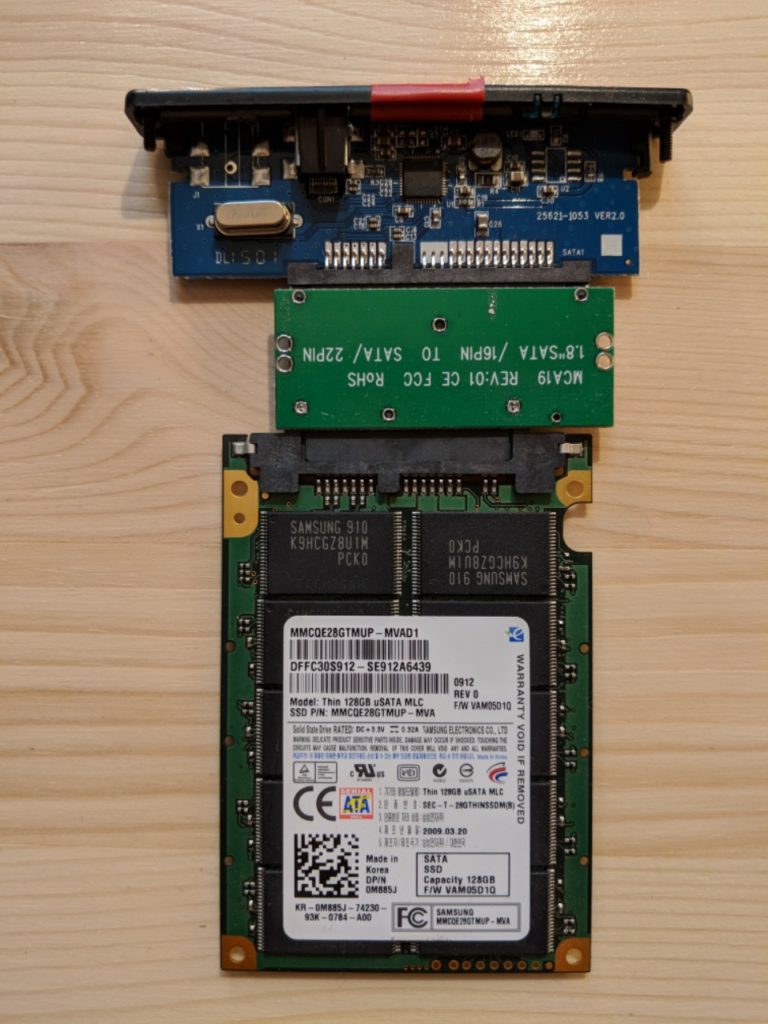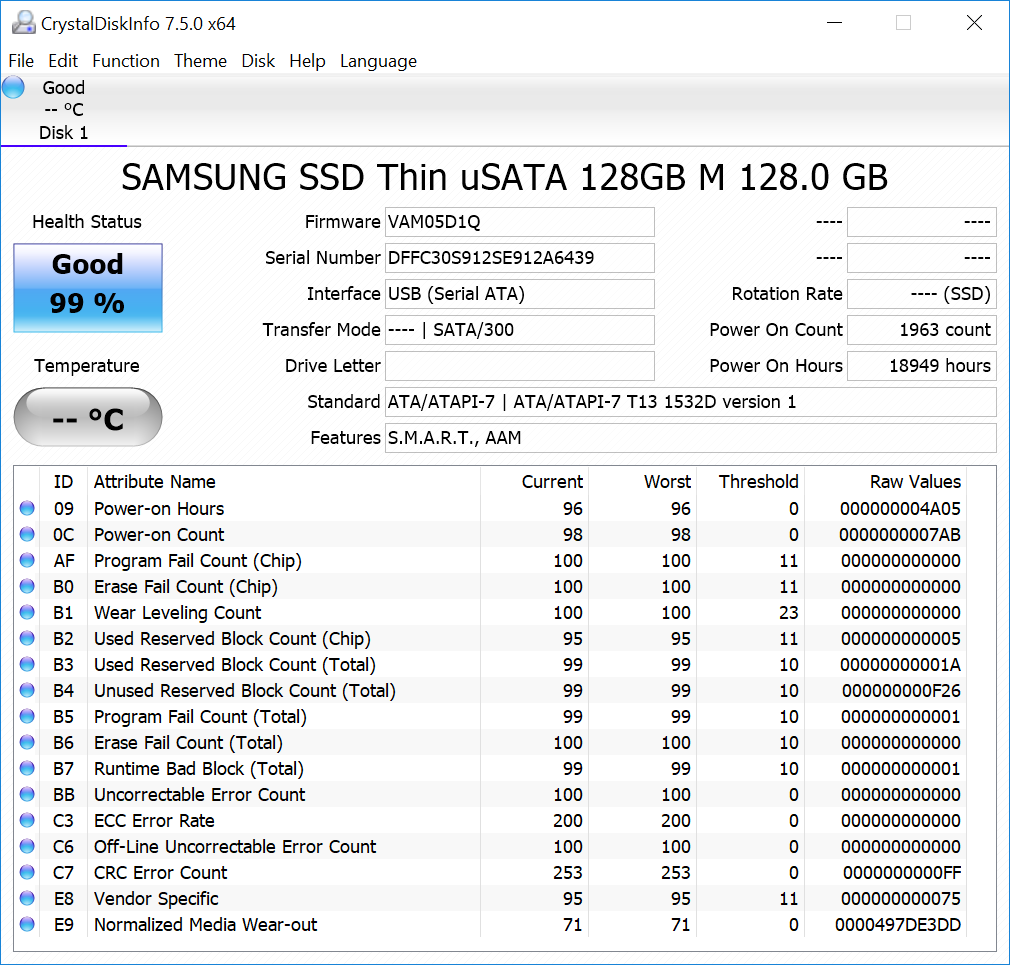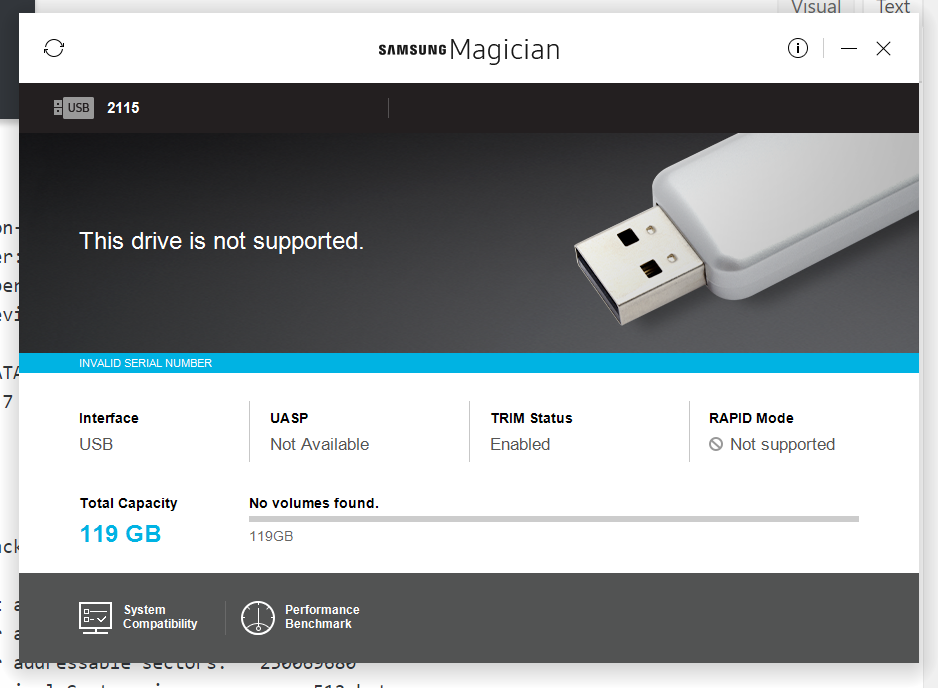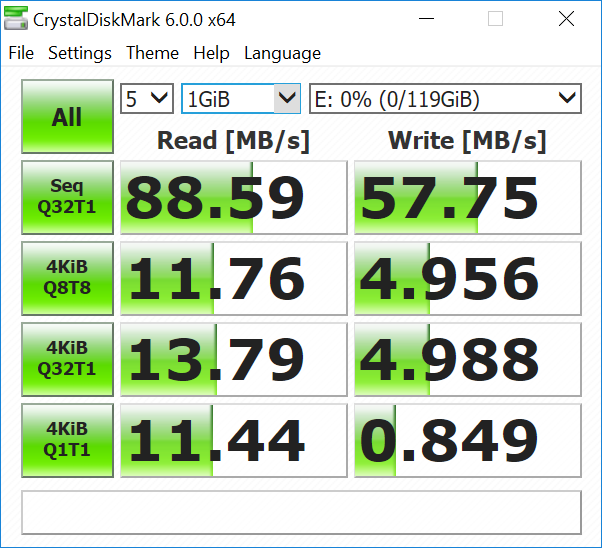I had a really old solid-state disk in need of wiping. It’s one of Samsung’s very first OEM models and I’m not even sure what machines they were originally installed into with their super-uncommon uSATA connector.
There’s no way to completely wipe out an SSD without resorting to specialized software from the manufacturer (Samsung Magician, for instance, if it supports the drive), or grinding it up in a shredder or smashing it to pieces.
But you can get somewhat close by writing all 1’s to the flash cells, which also resets them to their default electrically-erased state and can improve later writes.
Here’s how to do that (based on this and this):
$ tr '\0' '\377'The first erasure is slower than the second, even though I'm not sure this drive has TRIM support. CrystalDiskInfo says it doesn't. Samsung's Magician software says it does. The second and third erasures exhibit identical write speeds.
It's a weird drive anyways, but might still be useful as a relatively-quick portable hard disk, depending on the workload.
It is only useful for sequential writes. Its 4K and random write scores are pretty atrocious.
Before the wipe (drive filled with OS, data, etc.):
After the wipe (drive cleared with all 1s):
Under Ubuntu, the SATA drive information looks as follows:
$ sudo hdparm -I /dev/sda /dev/sda: ATA device, with non-removable media Model Number: SAMSUNG SSD Thin uSATA 128GB M Serial Number: DFFC30S912SE912A6439 Firmware Revision: VAM05D1Q Standards: Used: ATA/ATAPI-7 T13 1532D revision 1 Supported: 7 6 5 4 Configuration: Logical max current cylinders 16383 16383 heads 16 16 sectors/track 63 63 -- CHS current addressable sectors: 16514064 LBA user addressable sectors: 250069680 LBA48 user addressable sectors: 250069680 Logical/Physical Sector size: 512 bytes device size with M = 1024*1024: 122104 MBytes device size with M = 1000*1000: 128035 MBytes (128 GB) cache/buffer size = unknown Nominal Media Rotation Rate: Solid State Device Capabilities: LBA, IORDY(can be disabled) Standby timer values: spec'd by Standard, no device specific minimum R/W multiple sector transfer: Max = 16 Current = 16 Recommended acoustic management value: 128, current value: 0 DMA: mdma0 mdma1 mdma2 udma0 udma1 udma2 udma3 udma4 *udma5 Cycle time: min=120ns recommended=120ns PIO: pio0 pio1 pio2 pio3 pio4 Cycle time: no flow control=120ns IORDY flow control=120ns Commands/features: Enabled Supported: * SMART feature set Security Mode feature set * Power Management feature set * Write cache * Look-ahead * Host Protected Area feature set * WRITE_BUFFER command * READ_BUFFER command * NOP cmd * DOWNLOAD_MICROCODE SET_MAX security extension Automatic Acoustic Management feature set * 48-bit Address feature set * Device Configuration Overlay feature set * Mandatory FLUSH_CACHE * FLUSH_CACHE_EXT * SMART error logging * SMART self-test * General Purpose Logging feature set * WRITE_{DMA|MULTIPLE}_FUA_EXT * 64-bit World wide name * WRITE_UNCORRECTABLE_EXT command * Segmented DOWNLOAD_MICROCODE * Gen1 signaling speed (1.5Gb/s) *ssssss Gen2 signaling speed (3.0Gb/s) * Host-initiated interface power management * Phy event counters Device-initiated interface power management * Software settings preservation Security: Master password revision code = 65534 supported not enabled not locked not frozen not expired: security count supported: enhanced erase 6min for SECURITY ERASE UNIT. 6min for ENHANCED SECURITY ERASE UNIT. Logical Unit WWN Device Identifier: 50000f0056414431 NAA : 5 IEEE OUI : 0000f0 Unique ID : 056414431 Checksum: correctAlso under Ubuntu, the SMART information for the drive looks as follows, note the relatively large number of Power On Hours, this drive had a very heavy service life:
$ sudo smartctl -a /dev/sda smartctl 6.6 2016-05-31 r4324 [x86_64-linux-4.13.0-21-generic] (local build) Copyright (C) 2002-16, Bruce Allen, Christian Franke, www.smartmontools.org === START OF INFORMATION SECTION === Device Model: SAMSUNG SSD Thin uSATA 128GB M Serial Number: DFFC30S912SE912A6439 LU WWN Device Id: 5 0000f0 056414431 Firmware Version: VAM05D1Q User Capacity: 128,035,676,160 bytes [128 GB] Sector Size: 512 bytes logical/physical Rotation Rate: Solid State Device Device is: Not in smartctl database [for details use: -P showall] ATA Version is: ATA/ATAPI-7 T13/1532D revision 1 Local Time is: Wed Dec 27 13:51:49 2017 CET SMART support is: Available - device has SMART capability. SMART support is: Enabled === START OF READ SMART DATA SECTION === SMART overall-health self-assessment test result: PASSED General SMART Values: Offline data collection status: (0x02) Offline data collection activity was completed without error. Auto Offline Data Collection: Disabled. Self-test execution status: ( 40) The self-test routine was interrupted by the host with a hard or soft reset. Total time to complete Offline data collection: ( 360) seconds. Offline data collection capabilities: (0x53) SMART execute Offline immediate. Auto Offline data collection on/off support. Suspend Offline collection upon new command. No Offline surface scan supported. Self-test supported. No Conveyance Self-test supported. Selective Self-test supported. SMART capabilities: (0x0003) Saves SMART data before entering power-saving mode. Supports SMART auto save timer. Error logging capability: (0x01) Error logging supported. General Purpose Logging supported. Short self-test routine recommended polling time: ( 6) minutes. Extended self-test routine recommended polling time: ( 36) minutes. SMART Attributes Data Structure revision number: 1 Vendor Specific SMART Attributes with Thresholds: ID# ATTRIBUTE_NAME FLAG VALUE WORST THRESH TYPE UPDATED WHEN_FAILED RAW_VALUE 9 Power_On_Hours 0x0032 096 096 000 Old_age Always - 18948 12 Power_Cycle_Count 0x0032 098 098 000 Old_age Always - 1962 175 Program_Fail_Count_Chip 0x0032 100 100 011 Old_age Always - 0 176 Erase_Fail_Count_Chip 0x0032 100 100 011 Old_age Always - 0 177 Wear_Leveling_Count 0x0013 100 100 023 Pre-fail Always - 0 178 Used_Rsvd_Blk_Cnt_Chip 0x0013 095 095 011 Pre-fail Always - 5 179 Used_Rsvd_Blk_Cnt_Tot 0x0013 099 099 010 Pre-fail Always - 26 180 Unused_Rsvd_Blk_Cnt_Tot 0x0013 099 099 010 Pre-fail Always - 3878 181 Program_Fail_Cnt_Total 0x0032 099 099 010 Old_age Always - 1 182 Erase_Fail_Count_Total 0x0032 100 100 010 Old_age Always - 0 183 Runtime_Bad_Block 0x0013 099 099 010 Pre-fail Always - 1 187 Reported_Uncorrect 0x0033 100 100 000 Pre-fail Always - 0 195 Hardware_ECC_Recovered 0x001a 200 200 000 Old_age Always - 0 198 Offline_Uncorrectable 0x0030 100 100 000 Old_age Offline - 0 199 UDMA_CRC_Error_Count 0x003e 253 253 000 Old_age Always - 255 232 Available_Reservd_Space 0x0013 095 095 011 Pre-fail Always - 117 233 Media_Wearout_Indicator 0x0032 071 071 000 Old_age Always - 1232987101 SMART Error Log Version: 1 No Errors Logged SMART Self-test log structure revision number 1 Num Test_Description Status Remaining LifeTime(hours) LBA_of_first_error # 1 Short offline Interrupted (host reset) 80% 18456 - # 2 Short offline Interrupted (host reset) 90% 18456 - # 3 Short offline Completed without error 00% 12752 - # 4 Short offline Completed without error 00% 5 - # 5 Short offline Completed without error 00% 3 - SMART Selective self-test log data structure revision number 1 SPAN MIN_LBA MAX_LBA CURRENT_TEST_STATUS 1 0 0 Not_testing 2 0 0 Not_testing 3 0 0 Not_testing 4 0 0 Not_testing 5 0 0 Not_testing Selective self-test flags (0x0): After scanning selected spans, do NOT read-scan remainder of disk. If Selective self-test is pending on power-up, resume after 0 minute delay.This drive is a piece of junk, it is "just enough" SSD, which is why it came "free" as part of the selling points for a used laptop I bought off of eBay, and which is why I replaced it shortly thereafter with a proper Samsung EVO-series drive.




